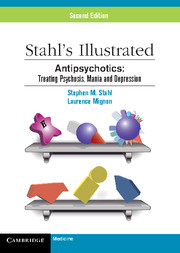Book contents
- Frontmatter
- Preface
- Contents
- CME Information
- Objectives
- Chapter 1 Neurobiology of Schizophrenia and Mood Disorders
- Chapter 2 Multifunctionality of Antipsychotics
- Chapter 3 Side Effects of Antipsychotics: Metabolic Issues and Sedation
- Chapter 4 Individual Antipsychotic Drugs
- Chapter 5 Schizophrenia Pharmacy and Switching Strategies
- Summary
- Abbreviations and Symbols
- Suggested Reading
- Index
- Continuing Medical Education Posttest
- Activity Evaluation
Chapter 4 - Individual Antipsychotic Drugs
Published online by Cambridge University Press: 19 October 2021
- Frontmatter
- Preface
- Contents
- CME Information
- Objectives
- Chapter 1 Neurobiology of Schizophrenia and Mood Disorders
- Chapter 2 Multifunctionality of Antipsychotics
- Chapter 3 Side Effects of Antipsychotics: Metabolic Issues and Sedation
- Chapter 4 Individual Antipsychotic Drugs
- Chapter 5 Schizophrenia Pharmacy and Switching Strategies
- Summary
- Abbreviations and Symbols
- Suggested Reading
- Index
- Continuing Medical Education Posttest
- Activity Evaluation
Summary
This chapter will describe each antipsychotic medication currently available in terms of side effect profile, dosing tips, and drug interactions. As with all atypical antipsychotics discussed in this chapter, binding properties vary greatly with technique and from one laboratory to another; they are constantly being revised and updated. Thus it is important to remain up-to-date on the specifics of each antipsychotic. This chapter will also introduce some of the new medications that are in development.
Even though it is very effective, clozapine is not considered a fi rst-line agent as it can lead to the potentially life-threatening side effect agranulocytosis. Weight increase and the concomitant risk of developing metabolic complications are greatest with clozapine.
Risperidone is also available as an intramuscular, long-term depot formulation that lasts two weeks. Risperidone does increase prolactin levels, but there appears to be less risk of weight gain with risperidone, as well as less cardiometabolic risk, than with some other atypical antipsychotics, at least in some patients.
Paliperidone may theoretically improve depression due to its alpha 2 antagonist properties but has not been extensively studied. It might however be associated with weight gain, insulin resistance, and diabetes as well as prolactin elevation, similarly to risperidone.
Paliperidone is the first atypical antipsychotic that has recently been approved as a once-monthly formulation for the acute and maintenace treatment of schizophrenia in the United States.
The 5HT1D antagonist actions combined with the 5HT and NE reuptake blocking properties might contribute to the absence of weight gain induction by ziprasidone, as well as its potential antidepressant and anxiolytic properties.
Similarly to ziprasidone, aripiprazole causes little to no weight gain, most likely because it lacks 5HT2C and histamine H1 properties. Additionally, aripiprazole does not seem to induce dyslipidemia, increase fasting triglyceride levels, or increase insulin resistance. Thus aripiprazole has a lower cardiometabolic risk.
Another side effect of zotepine is its tendency to increase QTc prolongation. Due to its norepinephrine reuptake inhibition, zotepine has the potential for antidepressant actions.
Although loxapine usually does not lead to weight gain, it might present a cardiometabolic risk. Loxapine has an intramuscular formulation, and its metabolite amoxapine is a tricyclic antidepressant.
- Type
- Chapter
- Information
- Stahl's Illustrated AntipsychoticsTreating Psychosis, Mania and Depression, pp. 109 - 144Publisher: Cambridge University PressPrint publication year: 2010



